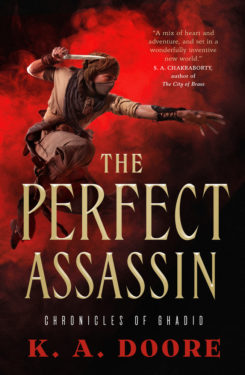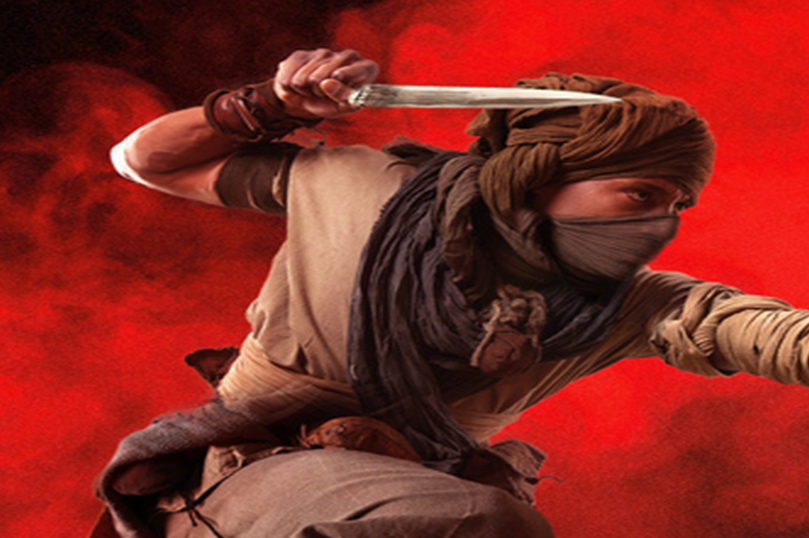 Divine justice is written in blood.
Divine justice is written in blood.
Or so Amastan has been taught. As a new assassin in the Basbowen family, he’s already having second thoughts about taking a life. A scarcity of contracts ends up being just what he needs.
Until, unexpectedly, Amastan finds the body of a very important drum chief. Until, impossibly, Basbowen’s finest start showing up dead, with their murderous jaan running wild in the dusty streets of Ghadid. Until, inevitably, Amastan is ordered to solve these murders, before the family gets blamed.
Every life has its price, but when the tables are turned, Amastan must find this perfect assassin or be their next target.
The Perfect Assassin will be available on March 19. Please enjoy this excerpt.
1
The wind tore at Amastan’s wrap, trying to slide warm fingers beneath the fabric and unravel the knots. It tasted of heat and dust, the only products of the sands that stretched endless before him. His tagel kept the worst of the sand from getting into his mouth and between his teeth, but he still had to squint to see through the onslaught.
If he turned and wove back between the buildings, the wind would taper and calm. But here on the edge of the city—on the edge of the platform—there was nothing between him and the sky and the sands several hundred feet below.
The sun had set and night fell fast. Straight east, the first stars began to appear. In another hour, the moon would rise and fill the void that the sun had left, but until then Amastan would have only the light the stars gave him.
It would have to be enough.
“The unshakeable Amastan isn’t scared, is he?” taunted Dihya. His eldest cousin stood to one side, her thick, muscular arms crossed. When he glanced her way, Dihya flashed him a smile that was all teeth. Amastan didn’t reward her with a response.
Silently, he reviewed for the fifth—okay, sixth—time the assortment of tools he’d brought. Rope, chain, knives, gloves, water, shoes. He touched the charm that hung between his collarbones. Its leather was soft and bulged with the usual herbs for protection. But for this journey, the charm maker had added a scrap of vellum inked with words that would protect him from jaan. At least, the charm maker had insisted it would. Amastan hadn’t exactly had a chance to test it in the city.
Fear tightened his chest at the thought of jaan. He pushed the fear away, breathing deep and focusing on the steps he’d take to complete this one, final test. A dizzyingly long drop and a short sprint across the sands was all that stood between him and becoming an assassin. While deceptively simple, Tamella had built this test around his weaknesses: strength, stamina, and a willingness to be flexible.
He couldn’t help but wonder if, on top of all that, Tamella had known about his fear of jaan. Nothing got past his teacher, but then again, that specific fear had never come up during their years of training. He knew. He’d been careful about that.
The wild jaan below were little more than stories. Jaan were as rare as storms. He had nothing to fear but the time limit and, if he failed, Tamella’s disappointment. He wouldn’t run up against either with the right mindset and planning. He could do this. He would do this.
“Why’re you stalling?” asked Azulay, almost shouting as he overcompensated for the wind.
“Stop pestering him,” said Menna. She bounced up and down on her toes, betraying her own impatience.
Dihya, Azulay, and Menna had trained with him almost daily for the last five years. The four of them were this generation’s candidates, handpicked by Tamella to carry on the family’s secret, bloody tradition. In the beginning, the only thing they’d had in common was a very loose relation by blood and the family name they could claim if they wanted. Now, they shared calluses and scars, hopes and dreams, fears and nightmares. Now, they were cousins.
The other three had already completed their tests, each tailored to their particular weaknesses. Amastan had watched each of them pass with increasing trepidation. Tamella had promised that one of them would fail. And now here he was, the only cousin that remained.
“I just want him to go already,” whined Azulay. “I could be sleeping instead of standing out here, getting sand in my teeth.”
“Sleeping? Really?” Dihya’s voice was heavy with skepticism. “Don’t you mean losing baats gambling with the caravanners?”
“No. I mean sleeping.” Azulay paused, then added, “There aren’t any caravans at the end of season and you know it.”
“They’ll return in a few weeks with the rains, don’t worry,” said Dihya. “Now, can’t you enjoy watching your cousin sweat a simple climb with us? It’s not often you get to see ’Stan nervous.”
“I’m not nervous.”
Amastan immediately regretted rising to the bait. Dihya laughed at him and his cheeks and ears warmed with the rush of embarrassment. Thankfully, his tagel hid any sign of his awkwardness from his cousins. He could’ve worn his tagel low tonight, since he was among family, but he’d chosen to wear it high, above his nose but just below his eyes to protect against the blowing sand.
“I’m sure Tamella was joking when she said one of us would fail,” said Menna.
This time, Azulay laughed, high and sharp. “Have you ever heard the Serpent joke?”
“Shut up, Az’,” said Menna. “I’m trying to give him some confidence.”
Amastan closed his eyes, ignoring them both. He took a deep breath, then cast away all of his doubts and focused on the task at hand. It was simple, really.
First: he had to get down to the sands.
A metal cable hung above his head and plunged from the edge of the platform into the thickening darkness. Somewhere below, its other end was affixed to a large pole dug deep into the sands. During the day, a carriage descended on that wire to pick up anyone waiting below. Now, at night, the carriage was locked in place at his back.
He wouldn’t be unlocking it; Tamella had made it clear that he couldn’t take a carriage down. One would be waiting for him on the sands beneath the next neighborhood, but it was up to him to find a way to it in the allotted time.
Amastan adjusted his tagel and wrap, testing the knots and pulling the fabric taut. Then he uncoiled his rope with a flick of his wrist. He wound the rope around his waist twice, looping it through his belt each time, before pulling a length of chain from the bag at his feet. Fabric wove through the links on both ends and covered the metal in cloth. He tied the rope to one end of the chain, then stood on his toes and tossed the chain over the cable. He caught it and tied off the other end.
With both hands overhead to keep the chain from slipping down the cable, he paused to reassess his preparations. Had he forgotten anything? He had two sheathed blades at his waist and a smaller knife strapped to his bicep. Charm pouch. Full water skin. Wrap and tagel were knotted tight. He even had a fire striker and tinder. Just in case.
He had everything he needed and time was falling fast. Yet he hesitated. Why?
Sometimes, said his sister Thiyya in the back of his head, you don’t even know when you’ve been possessed by a jaani.
Thiyya had liked to frighten him with tales about jaan and madness when he was young. In Ghadid, the jaan were little more than words whispered late at night to scare children, yet Amastan had never been able to shake his fear of them. Now dread squeezed his throat as he faced the reality that he would have to walk on the very sands where the jaan weren’t just stories. Jaan that struck travelers mute and made it impossible to find any path. Jaan that entered minds and drove men mad. Jaan that made you forget who you were.
“Right,” said Amastan, pushing away his fear with that one word.
And with that, he took one, two, three steps to the edge of the platform and—before he could think—a fourth step onto nothing. Amastan dropped. Someone gasped. Not him: he was holding his breath to keep from screaming. Down, down, with just enough time to panic—then a jolt as the cable caught his weight and now he was truly falling, flying forward into dizzying darkness. The screech of metal chain on metal cable was almost as loud as the wind wailing in his ears. Despite his care, his wrap caught and flapped in the rush.
The chain warmed, then turned hot, the metal burning his hands even through the cloth he’d wrapped around it. He glanced back once to see the pale glow of the platform reeling away like a horrible dream. The friction between the chain and the wire spit up a trail of sparks that dazzled his eyes and soon hid the platform’s glow.
It was much easier to face forward, his knees curled up to reduce drag. If he tucked his chin in, just so, then he avoided the worst of the wind. Still, his eyes watered and smarted as he sped down, down, down toward the smear of darkness below.
Soon he burned all over, from his abdomen to his shoulders to his hands. He tightened his grip on the chain despite the pain of forming blisters. Just another moment, then another—
Suddenly, the ground was more than a blur. He could make out the lines and ridges the wind had sculpted in the sand. Amastan could see where the cable terminated at a long metal pole that grew from the ground like a miniature pylon. A pole he’d run smack into if he didn’t do something, fast.
He twisted the chain around the wire until its screech was louder than the wind. He slowed down, but not enough. The pole was coming at him like an angry camel. He pulled harder and the chain burned as hot as fire. All he wanted was to let go, but now he’d slowed from a panicked gallop to an ambling run.
The pole was a dozen yards away, a dozen feet—finally Amastan let go and dropped the remaining short distance to the sand. The rope around his waist caught and stopped him from falling face-first. The chain kept sliding until it hit the pole with a loud clang that was swallowed by the emptiness all around him.
Fingers shaking, Amastan undid the rope’s knots and unwound it from his waist. He coiled it tight and slipped it through his belt. He fished the chain out of the sand and held it by its tattered cloth, the metal still too hot to touch. Then he swore under his breath and dropped the chain, letting the sand claim it. The links at its center were all but melted through. Another few seconds and it would’ve snapped.
He pushed the thought away. Another few seconds would’ve seen him swimming through sand. It was nothing to worry about.
Amastan turned in place, scanning every inch of his surroundings. Sand, sand, and more sand. But when he looked closer, there was more than just sand. Small rocks were scattered across the landscape, clustered close to the pole. The persistent wind had shaped the sand into patterns and ridges. Farther away the sand rose and fell in bumps and bubbles like the surface of rising bread.
Farther still, a wide swath of darkness cut through the sand and sky and rose impossibly straight and impossibly far: a pylon. A circular platform capped the pylon, a faint glow delineating its edges against the night sky. More pylons broke the ground and the sky to the west, spreading north and south in a gradual curve that hugged the Wastes. There were easily hundreds of them, each holding up its own circular platform and life.
Ghadid. The city looked so distant and empty from beneath. Amastan realized how bizarre it must appear to the iluk who spent their entire lives down here. He wished he could see it during the day.
The wind picked up, whispering and reminding him that time was falling. He counted the pylons nearby, placing them on his mental map of Ghadid. He needed to go to the next neighborhood to find the carriage, which meant he needed to head for the—one, three, five—seventh pylon away. He could just barely discern its hulking shadow in the darkness. He would have to run to make it in time.
He unslung the sand shoes on his back. They’d cost more baats than they were worth, but that was the price he’d had to pay, wanting an iluk item when no iluk were around. The leather straps were already perfectly set for his bare feet. He had the shoes on and tightened within seconds.
The sand felt more like firm ground. He took a few steps, then jogged a few more. The sand was slippery and deceptive, but if he put his foot down just so, he wouldn’t lose his balance. Good.
A dim, silvery glow hulked on the horizon: the moon threatening its arrival. He had until the moon had fully risen to make it to the carriage. Twenty, thirty minutes, maybe. Enough time to traverse the same distance up above, in the city. Down on the sands, with no buildings or bridges between him and his destination, it should take even less time.
So why did he feel so nervous?
He ran. He stumbled a few times before finally finding his stride. The shoes were wider than camel feet and helped spread his weight out across the sands and keep him from sinking. But the extra width was tricky to walk with, let alone run. He fixed his gaze on the direction he needed to go and didn’t think about how open and empty his surroundings were. The sands extended forever on all sides, leaving him nowhere to shelter or to hide. He was exposed. Alone.
Except.
Except he didn’t feel alone. The back of his neck prickled as if someone, somewhere was watching him. But that was impossible. No one could see him from the city and no one else would be down here this late in the season, when all the wells were dry.
No one sane, anyway.
Just the wind, he told himself.
Jaan ride the wind, whispered his sister late at night as the wind whistled through the cracks of their home. The candles had flickered and spat, sending shadows skittering across Thiyya’s grim smile. He glanced back. He couldn’t help it. But there was nothing except sand, dark and starlit. The night had already swallowed the cable he’d come down on and its metal pole, but he couldn’t yet see his destination. He felt displaced. The pylons moved past at an indeterminable and unstoppable rate, as if they were the giant sajaam of old. The only noises were the shh-shh-shh of his footfalls, the wet rasp of his breath beneath his tagel, and the wind.
Where was the cable? He stared hard ahead, willing the darkness to reveal a hint of metal. He counted the pylons, matching them to the map of Ghadid again. The city he knew so well, he could navigate its rooftops blindfolded. But down here—
He wasn’t lost. That was impossible. He’d headed straight north, which should have brought him within spitting distance of the next cable. That is, as long as he’d kept running straight. And he had . . . hadn’t he?
The fear he’d been suppressing flared, threatened to overwhelm him. For a moment, he knew he was lost. He’d never find the carriage in time. Tamella would leave him stranded down here until morning and by then he’d be driven mad by a jaani. His mind, his memories, his self—everything would be gone.
Or—he told himself forcefully, shoving his fear back down—I’ll find the carriage and everything will be fine.
There—a glint in the darkness, a line cutting through the air. The next cable. Relief flooded him and only then did he realize how terrified he’d been. He was going to be fine. He was going to complete this test. Soon he’d be back platformside, surrounded by his cousins, safe from jaan. He would laugh at his fears. Tamella would congratulate him. And he would never have to come down to the sands again.
Except . . .
Where was the carriage? He’d traced the cable down to its pole, but the pole was empty. In another minute, he reached the pole and stopped. He touched it, reassuring himself that this was real. The pole was still warm with the day’s heat. But there was no carriage.
He followed the cable back up with his gaze. He could see the platform, the warm glow of torchlight spilling over its edge, but no movement; nothing approaching. He turned, checked the horizon. The moon had peaked over the edge, but he still had time before it fully rose.
He wasn’t too late. So where was it?
Amastan checked the sand around the pole for marks, but there were only his own prints. If he wasn’t late, was Tamella?
He swallowed, his throat scratchy and dry. He shifted from foot to foot and took a swig of water. The wind picked up. His water skin slipped in his sweaty palms and almost fell. He caught it and rehooked it to his belt with trembling fingers.
Focus . . . focus . . . he needed to focus on his next steps. The carriage would come down. He would be off the sands, soon. He just needed to wait and be patient. Unlike Menna, he was patient. He could wait forever.
The wind swirled around him like a hot breath, hissing in his ears. His heart pounded fast as if he were still running, even as he stood and waited. That feeling of being watched returned.
You can’t see a jaani coming, said his sister.
The moon cast off the horizon and rose like a dream into the sky. Its thin light spilled across the sands, casting a million tiny shadows and throwing the pylons into stark relief. Amastan could see better now, almost as well as at midday. That only made everything worse.
He could see the wind swirling across the sand. He could see the dunes in the far distance, a blurred threat. He could see things that he knew weren’t there, figures in the corner of his eye that were only shadows when he turned. And he could see that the cable was still empty, that no carriage was on its way.
Dread knotted and weighed down his stomach. Despite the prickly heat, he felt a chill. He realized, then, that the carriage wasn’t coming. Of course it wasn’t. Tamella was testing his weaknesses, not his strengths. He’d prepared for exactly what she’d told him to prepare for, but the test was more than that. If he was patient, he would fail.
Would that be so bad? Tamella expected one of them to fail and it might as well be him. After all, he was the one who’d begun to wonder whether or not he could really be an assassin. It’d all been fun when it was theoretical: a set of skills to master, a family legacy to uphold. But as the day of his final test approached, the reality of his new profession set in. Doubt had spread its smoky tendrils through him as the question he’d brushed aside so easily in the beginning returned like a wild jaani whispering in his ear:
Could he kill?
Something hissed, angry and sudden. Amastan whipped around, a knife already in his hand. But there was nothing, no one, for as far as he could see. His heart thudded, heavy as a rock. The hiss came again, but this time he realized it was only the wind rushing across the sand. The emptiness was getting to him.
Never mind failing. He had to get off the sands. The carriage wasn’t coming, wouldn’t come, and there was only one other way up. He took the sand shoes off first and left them next to the pole. He used his knife to cut a notch in the bottom of his wrap, then tore off a long strip. He cut the strip in two and wound one piece between his fingers and across his palm. He tied a knot just below his wrist. He balled his hand into a fist, adjusted the fit, then did the same to his other hand.
With his hands protected, he unwound the rope from his belt.
Like before, he looped it twice around his waist and tossed one end over the cable. This time, he twisted a loose knot around the cable before tying the rope off at his belt. He tested the knot. It slid up the cable until he put his weight on it, then it tightened and held. Good.
He squatted deep, then leapt high, grabbing the cable at chest level. With a heave and a swing, he hooked one leg over it. He hung sideways for a breath, then he swung the other leg over. He swayed upside down from the cable while he tested his weight and strength. Then he made the mistake of sighting along the cable at the distance he must climb. It was so far.
Too far.
The words were so low he almost thought they were his own. The wind had picked up, its hiss become a whistle become a low moan. Amastan hummed a prayer, then focused on the cable right before his eyes. Hand over hand, foot by foot—that was his plan.
He began climbing.
The cable was taut enough that it didn’t swing, but it bounced just a little each time he moved. He held tight with one hand and reached as high as he could with the other. He followed his hand with his body, pushing off the cable with his legs while he pulled with his arm. Then he slid the knot the half foot or so he’d climbed before repeating the whole process.
Too far, said thoughts that were not his.
Jaan talk in your voice, said his sister, eyes alight with candle glow. Was his charm hotter than before? The wind louder? For a moment, all Amastan could do was hold on, paralyzed by his fear. But he had to move, had to get away. So he kept climbing.
The first few minutes were easy. His arms were strong and he made it several feet before taking a break. He looped his arms around the cable and hung for a moment, his muscles burning.
Too far, said the jaani. But this time Amastan ignored it.
The next few minutes were more difficult. His muscles kept burning, even when he rested. Minutes blurred into hours and days and became endless and Amastan refused to think about anything but the next movement. Slip the knot forward, stretch, grab, pull. Ignore the sharp pinch and the growing fatigue in his shoulders. Repeat. Repeat.
Repeat.
He only made the mistake of gauging the remaining distance once. While he could see the platform’s edge, it was still miles and miles away. For a moment, his stomach plummeted. He wondered what was so bad about letting go and falling. Everything hurt, everything burned, and he couldn’t possibly go any farther. But this time, there was no voice in his head.
This realization gave him a burst of energy. He brought his gaze back to the cable and slipped the knot farther along. Stretch. Grab. Pull.
When he finally crossed the platform’s edge, he didn’t notice. His outstretched hand touched cooling metal and he started out of his trance. He looked up to see a carriage in his way. Then he looked down.
He hung above the platform, having crossed over the edge several feet ago. He stared at the solid ground so tantalizingly close, but his arms and legs were too stiff to move. He’d have to hang here until morning, when the watchmen would find him and unhook his limbs.
“Congratulations, Amastan,” said a voice from the darkness. “You’ve passed. Now stop being ridiculous and come down from there.”
Copyright © 2019
Order Your Copy












Comments are closed.
Leave a Reply